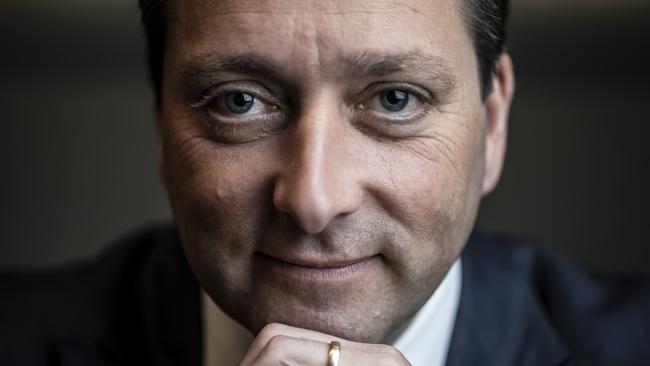Matthew Guy: ‘I’ve seen whites of their eyes’:
Matthew Guy is on track for a crushing defeat that could deliver more power to Daniel Andrews. But the Opposition Leader is adamant he can win.

The latest Newspoll has Matthew Guy on track for a crushing defeat that could deliver even more seats to Daniel Andrews when Victorians go to the polls in 12 months, but the Opposition Leader is adamant he can win, declaring the state is not the “haven of left-wing ideology that some people make it out to be”.
The Liberal leader hints at a campaign strategy that will focus on marginal seats in outer suburban growth corridors.
“I’ve seen a lot of polls over 15 years in politics. Today is the day 15 years ago I was elected. I remember seeing Brumby at 60-40 and he lost 10 months later, so I’m frankly over opinion polls,” Mr Guy said this week.
“Our internal polling is reasonable. We’ve got a job to do. We know that. It’s been done before.
“Nineteen seats has been done by Bracks in ’02, Kennett in ’92.”
While the Coalition needs to win 19 seats to form majority government, last week’s 58-42 Newspoll has it on track to lose another seven, resulting in its numbers in the Legislative Assembly falling to just 20, or less than a quarter of the 88 MPs.
A Roy Morgan poll published on Thursday is even worse for Guy, with Labor leading the Coalition 59.5-40.5 compared with the 57.3-42.7 margin at the 2018 election.
Asked to explain why a Premier who has locked Victorians down for 8½ of the past 20 months remains popular, Mr Guy says: “I think Victoria is very segmented as a market, and I think in many markets, he’s not.”
“I think this view that he’s somehow unbeatable is wrong. I’ve seen politicians claim they’re unbeatable, the media and others think they’re unbeatable, from Nick Greiner, to Jeff Kennett.
“I don’t think Victoria is this haven of left-wing ideology that some people make it out to be. It’s not. Victorians are pragmatic. What they need to see from us is a commonsense way forward, a sensible alternative, which is what we’re trying to be and what we’ve, I think, been successful in being for the last few months.”
Like Andrews, Guy is a suburban father of three who has spent almost all of his adult life working in politics.
With Ukrainian grandparents on his mother’s side who left the Soviet Union in 1949, Guy, 47, grew up in what were then Melbourne’s outer northeastern suburbs, graduated from the local state high school in Montmorency, and studied politics and history at La Trobe University.
Having joined the Young Liberals at uni, he got a job as then premier Jeff Kennett’s director of research, completing a brief Canberra stint as media adviser to then assistant treasurer Rod Kemp, before returning to Spring Street as then opposition leader Denis Napthine’s chief of staff between 1999 and 2002.
After a failed bid for the outer northern Melbourne seat of Yan Yean in 2002, Guy went to work for the Victorian Farmers Federation and later ASIC, before being elected to the upper house in 2006. In 2014 he made the move to the Lower House in his northeastern Melbourne seat of Bulleen, becoming opposition leader after Napthine’s election loss.
Asked what he thinks cost him the 2018 election, Guy says he could name a dozen reasons, but ultimately points to messaging.
“The place is a mess. The debt’s never been larger. Waiting lists have never been worse. Our kids’ educational standards have never been as poor as they are. The Labor Party has been in office for 18 of 22 years. They can’t escape the blame for that. So therefore, we’ve got to get that message across. I don’t think last time we did,” he says.
Having regained the Liberal leadership from Michael O’Brien less than three months ago, Guy is adamant he’s the best hope his party has. “I know this government, I know this Premier. I’ve seen the whites of their eyes longer than anyone else in the parliament, and probably the state, and I think that I know what kind of campaign they’ll run,” he says.
Guy says he agrees with analysis pointing to volatile voter sentiment in seats that have historically been working-class Labor heartland and have been hardest hit by the pandemic.
“I wouldn’t give away any campaign strategies, but your analysis is right, and I would add to that it is particularly growth areas,” he says.
“We haven’t had enough focus on growth areas, from the outer west to the north to the outer southeast (of Melbourne), as we should have, federal and state, for the best part of 20 years.
“We’ve done a lot of work in growth areas in the last few months, in terms of where we need to be.”
The Premier’s office declined an interview with The Weekend Australian, and those of both major Melbourne newspapers, but agreed to a series of television interviews with the ABC and commercial networks.




To join the conversation, please log in. Don't have an account? Register
Join the conversation, you are commenting as Logout